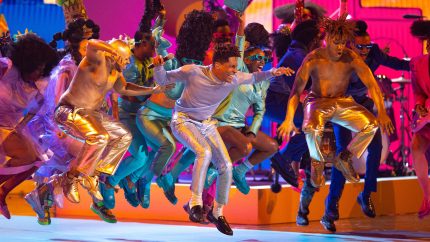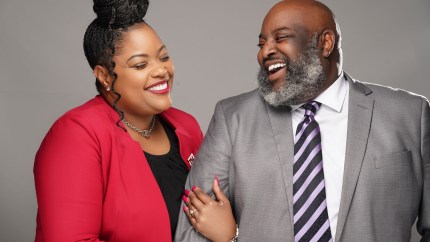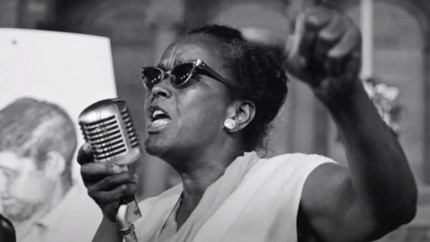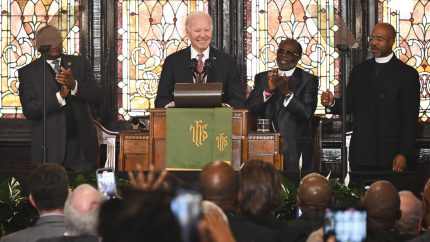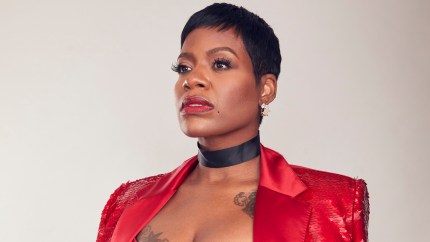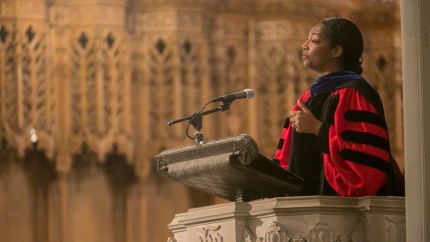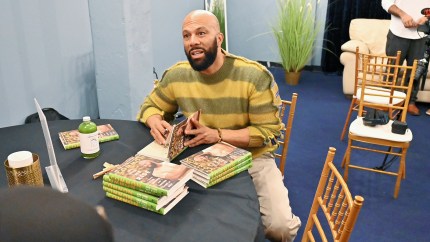Soul-stirring: What can ‘Gospel’ do for you?
Whatever our relationship to the Black church, there is a rich legacy of Black gospel music and preaching to explore in PBS's 'Gospel' documentary.
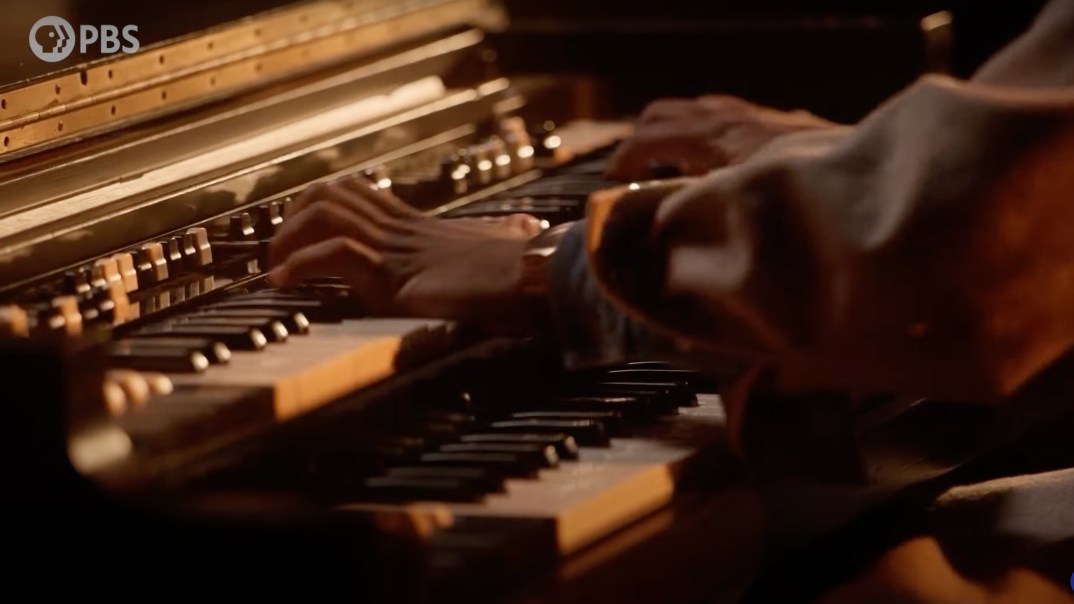
One of the most popular and perhaps recognizable visual icons of the civil rights movement is sharecropper and voting rights activist Fannie Lou Hamer, as she speaks or sings. Hamer is often celebrated during Black History Month; however, many of us have never listened to her voice and the ways in which her mastery of the oral tradition, both singing and preaching, was a key ingredient in her community organizing. Compelled to lift her voice after having suffered countless injustices as a disinherited African American in the South, the actual sound of Hamer’s voice illuminates the power she wielded as she spoke truth to power.
As we listen to recordings of Hamer’s voice on the album “Songs My Mother Taught Me” (2015), we hear the cultural tools that countless charismatic leaders use in African American oral transmission that demonstrate “the capacity to move seamlessly between singing and speaking, leading groups through countless configurations of solos, lining out, sermonizing, call and response, scripture recitation, and prayer. African-American orality is a highly participatory tradition in which leaders and audiences interact with each other.” Hamer is but one example of a long line of public figures who embody and/or harness the giftings of preaching, storytelling, and music-making to amplify their voices toward liberation.
Wherever we are on the spiritual or religious spectrum, the contribution of the Black church to U.S. culture is undeniable. Specifically, when it comes to the realms of preaching and gospel music — modes that deeply harken to our African griot roots — we are collectively transported to our past, informed about our present, and forecasting our future. These two modes of communication, when done in earnest, can immediately draw us into a state of inspiration that, in turn, compels us to draw upon our strength to face the toughest of days, help find meaning in the mundane, or assist in helping us find a place to flourish, even in a nation that mostly rejects us. This is the true spirit of the Black church, rooted in a legacy of gospel music and preaching.
To continue to progress and flourish, we must capture the culturally relevant essence of these modalities, strategies we have long used to mobilize our people. Now, no less an expert than Dr. Henry Louis “Skip” Gates is researching and highlighting the tradition that uplifts us in ways we not only recognize but are uniquely crafted for our upliftment.
This legacy is currently documented through PBS’s “Gospel.” Accurately positing that “from the blues to hip hop, African Americans have been the driving force of sonic innovation for over a century,” the documentary’s producers remind us that “Musical styles come and go, but there’s one sound that has been a constant source of strength, courage and wisdom from the pulpit to the choir lofts on any given Sunday. ‘Gospel,’ the latest history series from Henry Louis Gates, Jr., digs deep into the origin story of Black spirituality.”
A poignant exploration with contributions from yours truly, Dr. Alisha Lola Jones, among other notable figures such as Grammy award-winner Donald Lawrence, Senator Raphael Warnock (D-Ga.), and soul legend Dionne Warwick, among others, “Gospel” is a moving examination of the profound influence and enduring legacy of Black church music and preaching. Through the seemingly innumerable featured experts, we learn the impact our oral tradition has had on the global marketplace while also transforming lives.
As faith leaders who grew up in the church as pastors’ children, we have witnessed the impact of the Black church through the pulpit and music ministry. We are also deeply aware of the willful blind spots of the church that have turned off many of our peers from embracing this world.
In a recent interaction with a Black scholar who grew up in the church but has since renounced her label as a “Christian” due to maltreatment received within the Black church, she professed that regardless of how she feels about the institution, Black church culture shaped her identity in undeniable ways that continue to compel her to maintain a connection with her people and culture. Indeed, She understood that whatever harm she encountered did not preclude the benefits or her desire to draw inspiration, fulfillment, or hope from the music, preaching, and community the Black church can foster. In short, even with all the hangups of the Black church, there is something meaningful our culture can still glean when it comes to gospel music and ministry.
Recommended Stories
For Black people, vocal and instrumental music carries much of who we are as a culture. Our African heritage and souls’ vibrations are expressed through music’s unique rhythmic flows, so much so that wherever we are in the diaspora, every genre of our music can find a common thread.
There are many great orators in Black history we can look to who embody what we have come to understand as great preaching. Whether Harriet Tubman or Frederick Douglass during the abolitionist movement, Prathia Hall and Dr. Martin Luther King Jr. during the civil rights movement, or even poet Nikki Giovanni in conversation with once-aspiring preacher James Baldwin, great spiritual communicators can have a profound impact on raising the consciousness of the people and influencing the course of the nation. The Black prophetic tradition is more than simply stirring the hearts of individuals; it may also be about speaking truth to power.
Gates’ documentary “Gospel” fills a widening chasm between Black Americans and the Black church by capturing firsthand accounts of how the magical combination of message and music has consistently saved, compelled, and organized us. Our faith in a power greater than our own has been bolstered by the power found in those messages and music. Whether or not we return to formal spiritual communities, we may review and return to the footage, recordings, and publications of our great gospel tradition, finding themes upon which to meditate, find sustenance, absorb wisdom, and transform lives. May we be uplifted by the blueprints specifically designed for us in our time-honored tradition, and may we use them to flourish in our Black futures together.
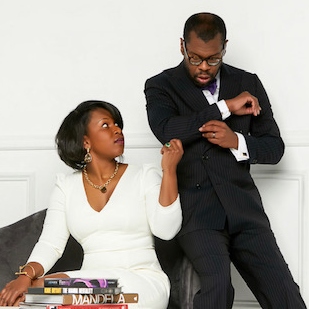
Rev. Dr. Alisha Lola Jones is a faith leader helping people to find their groove in a fast-paced world, as a consultant for various arts and faith organizations and professor of music in contemporary societies at the University of Cambridge in Cambridge, England. She is an award-winning author of Flaming? The Peculiar Theopolitics of Fire and Desire in Black Male Gospel Performance (Oxford University Press). For more information, please visit DrAlisha.com.
Rev. Calvin Taylor Skinner is dedicated to empowering frontline communities in Knoxville, Tenn. and the United Kingdom. He uses faith and policy to address energy justice, criminal justice reform, voter education/mobilization, electoral politics, and global affairs. Along with his wife, Rev. Dr. Alisha Lola Jones, they lead InSight Initiative, a consulting firm focusing on capacity building and live events production.
Never miss a beat: Get our daily stories straight to your inbox with theGrio’s newsletter.
